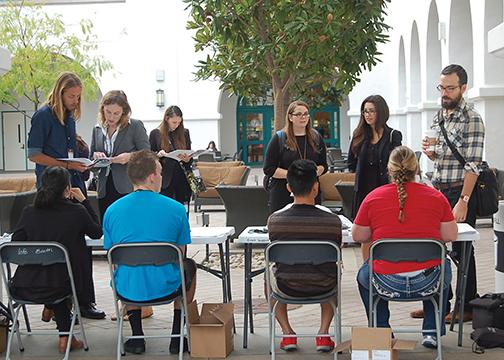San Diego State’s Philosophy Club is a student organization that holds discussions, lectures and events for anyone who wants to talk about philosophical issues. Discussions could range from specific current events to topics covered in philosophy classes.
However, the goal of the club is to promote thoughtful reflection among students about their lives, no matter what department they are in.
“It provides an extremely welcoming atmosphere for students of all majors,” philosophy graduate student and Philosophy Club officer George Tibbitts said. “So those with little background are just as welcome as philosophy majors. Club discussions are decided in advance, based on general interest or a student’s presentation. We encourage discussion, but this can be a great place to hear new ideas.”
Besides the regular discussions, students and faculty often give presentations to the club. The club also prepares members for ethics bowls, a type of debate over specific ethical situations, and is associated with the Southern California Philosophy Conference and other conferences.
The club has many practical uses. Philosophy and public relations senior and Philosophy Club President Courtney White noted that people can tell their parents about the many CEOs, entrepreneurs and lawyers who have come out, attributing much of their success to philosophy.
Members can use the club as a tool to recognize how to argue an issue from any side.
“I have found it to be a great place to practice speaking in front of people and receive useful feedback,” Tibbitts said.
But philosophy is more than just argument. The Philosophy Club is different from a debate club in that people learn to break down issues and analyze them specifically and thoroughly, rather than just learn rhetorical skills.
The club is also for those concerned with more general ideas: being a better person, increasing their knowledge about the world or learning things about different occupations.
White described how the club can be a great outlet for students who are concerned with philosophical issues, but have no other way to talk about them.
“I think a lot of people come because it gives them a place to talk about things their friends don’t like to talk about,” White said. “Maybe they don’t feel comfortable asking those questions in their home, if it doesn’t line up with religious beliefs they have. It gives them a comfortable space to talk about anything in a philosophical way.”
For White, the club has quite a bit of personal significance.
“I looked into the philosophy club just as an extracurricular activity, and I thought ‘this is the community I am supposed to be a part of,’” she said. “They made me feel really at home and I quickly became friends with many people in the department. It was a really good decision for me.”
She noted that for anyone who wants to reflect deeply, who wants to know why we do the things we do, or who feels unsatisfied, it is a really great place to go to sort oneself out.
“You don’t have to be a philosopher to think about things philosophically, and it’s just helpful,” she said.
Through discussing these ideas and issues, she thinks it can indirectly help people better their lives. White described how philosophy can be useful in any person’s life.
“The Philosophy Club provides a great community to feel like being engaged with the world doesn’t make you nerdy or weird. It’s not a negative thing,” White said. “You shouldn’t feel like you’re the only person in your immediate environment who cares about the way that the world functions and the purpose of their lives.”









